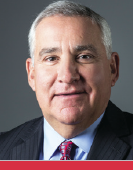 Divam N. Mehta, Founder
Divam N. Mehta, Founder
Mehta Financial Group
Richmond, Virginia
1. Proper asset allocation and diversification still hold as much value today as the day Harry Markowitz theorized the efficient frontier and MPT. Advisors, as much as clients, often get caught up in chasing returns during a bull market, rather than remaining disciplined to the core investment strategy that was designed for the client.
2. New clients are not going to magically walk through the door. Advisors who wish to organically grow their practice need to be proactive in building relationships, articulating their value proposition, and executing client meetings flawlessly.
3. Relationships are more important than returns. An algorithm can potentially generate solid returns. An algorithm, however, can never replace the value of an advisor’s ability to ascertain a client’s vision for their family’s financial security.
 Paul H. Auslander
Paul H. Auslander
Director of Financial Planning
ProVise Management Group
Clearwater, Florida
1. There is more job security now than ever before—as long as you are a financial planner. Consumers need financial therapists, not salespeople. Get a financial planning degree and then sit for the CFP exam. Then you’ll still need two years of direct experience working with a certified financial planner.
2. Find an older financial planner to hire and then mentor you. The right person will recognize that they need your very different skill-sets—by modernizing them through the use of social media and your ability to connect with children and grandchildren of the client.
3. If you want to make yourself indispensable to the mentor/boss, study for the CFA designation. The combination of CFP/CFA is credible, useful and marketable. It also tends to command the highest salary in most firms today.
 Rick Buoncore, Managing Partner
Rick Buoncore, Managing Partner
MAI Capital Management
Cleveland, Ohio
1. Build as big a foundation as you can so you have multiple options as opportunities present themselves. Get your CFP. Get your CFA. If you can go get your MBA, go get it.
2. You have to hire people, so find people who are smarter than yourself and whose skill sets complement yours.
3. Be ready to make sacrifices today in order to be better off down the road. As you start a business, it seems like every dollar you spend is another dollar out of compensation, but to have a viable, long-term business, you have to sacrifice and invest.
4. Be personal, because it can set you apart and help build a firm’s culture. Understand why you are in business.
5. Never trade your integrity for anything; it takes a lifetime to build, but only a moment to lose.
 Sheryl Garrett, Founder
Sheryl Garrett, Founder
Garrett Planning
Eureka Springs, Arkansas
1. To feel confident advising clients, I had to learn that I didn’t have to know all the answers. I simply needed to know enough to know the right questions and where to find those answers.
2. I learned that my “highest and greatest good” as a financial planner was providing holistic and objective financial advice. With that advice, many clients were capable and willing to do all or most of the implementation themselves. They didn’t need to pay me to fill out their name and address on a form.
3. After 11 years as a financial advisor, I finally fell in love with financial planning when I launched my practice as I would want to receive financial advice—on an hourly, as-needed basis.








